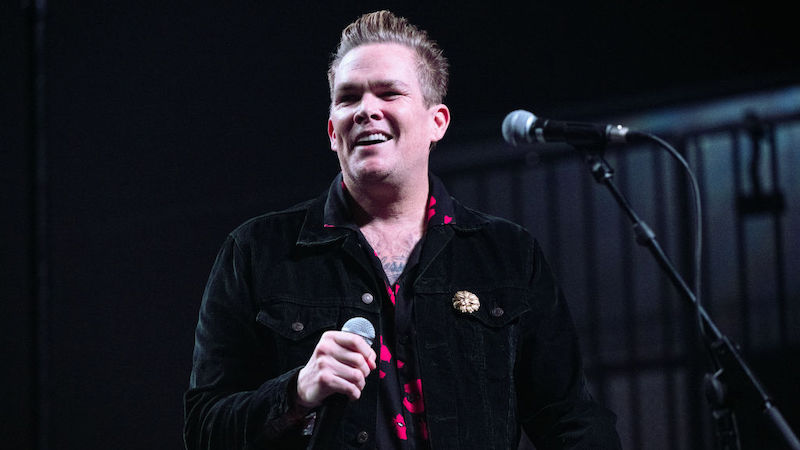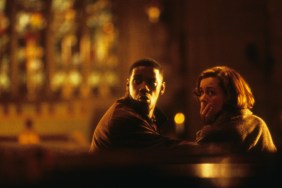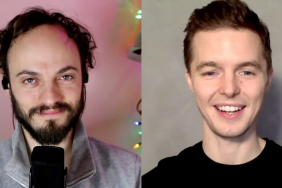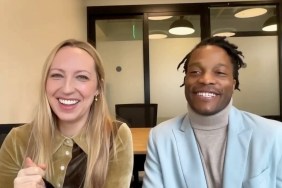ComingSoon spoke with Dark Side of the 90s host and Sugar Ray frontman Mark McGrath to discuss the upcoming season of the Vice TV docuseries. It premieres on Vice TV on June 14 at 10 p.m. Topics covered in Season 2 include tabloid journalism, COPS, the Ultimate Fighting Championship’s early days, and more.
“Dark Side of the 90s reveals the soul of the decade through the pop culture moments, trends, and people that captivated us,” reads the synopsis. “From the famous to the infamous, each episode tells a story that cultivates the warm and fuzzy familiarity of nostalgia, but surprises with revelations of the dark truths that existed in the shadows of the glitz, the glamour, and the headlines.”
Tyler Treese: We’re talking about Dark Side of the 90s Season 2, and the first episode is all about tabloid television and the pitfalls that this journalism leads to. Why do you think this is such a great way to start Season 2? Because we saw this parody in Anchorman 2, a few years back, and it’s such an interesting time in journalism. It’s very skeezy.
Mark McGrath: Yeah. I think tabloid TV ushered in what would eventually become social media. Everybody had a voice, and I think, for better, for worse, depending on your taste — and I have none — tabloid TV brought out the worst in human beings. All of a sudden you’re getting fighting on TV, you’re getting punches. It’s bringing out an element that was always on the fringe of society, but now it was brought forward. So it was fascinating in that sense and it really defined the 90s and it started this new Gonzo journalism, I guess, started by Hunter Thompson, but now it’s on TV. And I think as society and our morals decay, our television kind of decays around it, and now it’s social media. It’s put on blast now.
So, I think it’s great that everybody has a voice. That’s the good news. That’s also the bad news. I think tabloid TV really brought that to the forefront. So it’s a really interesting dive into that whole world and just how much tabloid TV really affected the 90s and the programs we see today, you know, I mean, I think the decade, the nineties in general, had such a profound effect on how we carry ourselves today because it was the last decade where we all had a sharing of TV, of music, of so many different things. Now it’s all, we’re all split off depending [on] what your likes are on social media. It’s kind of hard for me to articulate and really hit that bullseye bullet point of why tabloid TV meant so much, but I think the reason why I can’t really describe it is why it’s so omnipotent around all of us in the 90s.
The episode also goes into like the coverage of the OJ case and it feels like it’s all happening again [with] the Johnny Depp trial, it’s just moved on. Instead of TV, it’s on social media, but it’s so relevant. It’s shocking how watching this stuff, in retrospect, you realize these issues have morphed, but they haven’t disappeared at all.
No, that’s a really good point. I think I touched on that a little bit, that things that would never have made the evening news … I mean, I’m old enough to remember, that’s why I’m hosting the darn thing but I remember watching the Knick’s basketball game and then Al Michaels broke into the OJ chase, and I’m like, “is this national news?” You know? And then I’m like, “Well, of course, it is today, in the way society’s shifting.” Like you just touched on very intuitively, we’re seeing it today. Nothing is off-limits in terms of TV. I think the more reality, the more tabloidy, the more we sink our teeth into it, whether it’s in literature, whether it’s on social media, and is that the best for us?
I don’t know. I don’t know. I just can’t imagine Walter Cronkite back in the day, narrating the OJ chase, you know? I just can’t. I don’t wanna say things got worse in the nineties in terms of like a societal ethic and that’s getting too deep, but I think that the Dark Side of the 90s is called the Dark Side of the 90s for a reason. What it does is it touches on a lot of cornerstones and a lot of foundations that we see how news is delivered today. And a lot of it’s very divisive. Rarely is there a just objective news source anymore, and if you would’ve told us that in the 90s, we would’ve said you’re insane. You know what I mean? These are just fringe networks that are trying to apply to a certain demographic or a certain specialty political group. But today it’s either what team are you on? Our team or theirs? And I don’t think we could have ever predicted that in the 90s, you know? Tabloid TV had a lot to do with ushering that in.
RELATED: Interview: Mark McGrath Talks Dark Side of the 90s Season 1
The second episode in the season’s great as well, covering the COPS TV show. It was something that I didn’t really ever notice, because I grew up watching COPS and it’s like, “Wow, this is kind of dystopian that we would watch this on TV.” It was so accepted and celebrated at the time. So how interesting is it just looking back with hindsight on these cornerstones of the 90s where you didn’t really think too much about what was up with it and then you’re like, “Oh, this is kind of very weird. We weren’t really talking about this.”
Yeah, it is incredible. And it’s weird how there’s a connect-the-dots thing happening with tabloid TV, with COPS in particular. That show … because it had political slants that I didn’t really know until I narrated the episode. I’m like, “wow, I guess it was kind of pro cop the show.” And then getting to know the deep, dark down recesses and how the show was made. Because Dark Side of the 90s, they do the deep dives. That’s why the show is so compelling. And I’ve got to be honest, I’m not the biggest wrestling fan in the world. I watch every episode because of the way these shows are made. And I know I’ve got a sideline seat and a vested interested because I’m hosting it and narrating it. But I love these shows, that they’re incredibly well done. So they do the deep dives and with something like COPS …
let’s do a little retrospective of COPS. Imagine walking in, in 1989, early 90s, into a network and going, “I got this show, we’re going to follow a bunch of cops around and see what happens.” I mean, they got laughed out of every network. They got laughed out and thank God Fox, the network Fox that we did a episode on the first season. All these things are connecting and, now that I’m talking to you, Tyler, I’m having epiphany like, wow, the Dark Side of the 90s is really smart, way smarter than I am. So all these things are kind of connecting and showing you the fabric of the 90s, of kind of why we are here today. And I think it’s important to do these deep dives. Now COPS followed a bunch of cops around and I was fascinated the first episode because … I mean, I loved the Real World the same way.
I just loved reality TV. It had me right away. It was a very graphic look at policing and how it’s done. But then, it got into the Rodney King vibe, and that had worldwide … it was like a powder keg that blew up around the world about how policing was done. So you had to kind of look back at COPS and it was untouchable for a while, going into the odds in 2010. So it’s really interesting, this little show COP that Fox network took a chance on because they needed some programming became such a pivotal milestone in terms of programming that had political socio and even economic ramifications that we’re still feeling today. I don’t know for we’re any better off today than we were in 1989 when this thing first debuted.
So it’s really interesting that COPS was kind of synonymous with how policing was done. And then you see the pendulum swinging back today and how policing was being done. I don’t think they knew what they were making. And I think that’s what’s interesting about the 90s. We didn’t know what we were doing, we thought the decade was gonna end with Y2K. We get into that too. So we were just going “whatever, let’s just throw a bunch of shit against the wall,” and Sugar Ray was one of those things they threw against the wall and thank God we stuck. I wouldn’t be talking to you, Tyler. And by the way, I want to apologize, I go on a million tangents because I’m passionate about the Dark Side of the 90s. There’s so much deep dive, so much great stuff in there. And a lot of it connects and the more I talk about it, the more cathartic it is for me. So I think I owe you some money Tyler for talking me today.
I love your tangents. One of the episodes I’m really excited about is the UFC in the 90s, because it really was the Wild West back then. Narrating that episode, what really stood out about that time period? It’s so far removed from what the sport is now.
Looking back in retrospect, hindsight is 20/20, right? At the time, the brutality of it all, I thought we were all going to get arrested for watching the UFC back in the day, it felt like a fighting smut film. Guys were poking guys’ eyes out, people were getting punched in the nuts repeatedly. They would pair up guys like an 800-pound Sumo wrestler with 145 pound Brazilian Jiu-Jitsu artist, which back then none of us knew what Jiu-Jitsu was. No one knew what UFC was. No one knew what an armbar was. So to see the rise of this sort of voyeuristic, dark world viewing, it felt like guys that went in the back of a bar and hit a bar back in the 70s in Texas and just got these street fights to become a billion-dollar industry.
What it is today that is surpassing boxing at the gate. Nobody, nobody would’ve thought that back in the day! You had guys like Tank Abbott back in the day in early 90s, this guy would come out of a bar with a beer belly out to Texas, holding beers on his beer bottles, literally hung over from the night before he would fight. Tank Abbott today would never exist. Because MMA fighters are the most well-skilled athletes in the world. So I think it’s becoming this sort of shoestring, “Where are we gonna host this thing next in Alabama?” No one would sanction it! Nobody! I mean, you’re too young to remember Tyler, but I remember watching all those fights. I watched the first one until like 200 and then I kind of gave up when there was one on every weekend, but I watch the big ones still.
And for having to become this thing that like … if you look at the ESPN website, it’s an option. You can pick NBA, NHL, MMA, UFC, it’s so hardcore that it became this gigantic billion trillion dollar industry around the world. And it seems to be only getting bigger. They have these humble beginnings and it almost died many times. Dana saved it with the reality show that happened in the 2000s, That’s a little later, but it just became this gigantic … It’s fun to watch a sport grow from the ground floor. I think that’s what I can say most about it. And of course, there’s all the human stories, with so many wonderful athletes that, you know, came in, you know, that, that just triumphed over gigantic obstacles. But of course, it has the ups and downs. It was a dark business, let’s not lie. They cleaned it up a lot, but it was dark when it started. And that really, really is revealed in the UFC episode. And there’s two parts of it, there’s two. There was so much UFC going on, we had to have two episodes. There are two parts to it.
RELATED: Mark McGrath Reminisces About the Dark Side of the Viper Room
I’m looking forward to that. There’s a reason why John McCain was calling it human cockfighting and why it had to fight to survive there.
UFC back in the day, it was a tournament, it was a round-robin tournament. So you had to fight multiple times that night to win. So you had guys walking out there with their eyeball, falling out, missing a finger, like with a bullet hole on their side and they would go out and fight. So it was brutal, it was human cockfighting, like John McCain say, I said, and the only way they could become the gigantic sport is today by cleaning up. And they did. And it’s just incredible compelling sport. Just wanted to, wanted to tap that in there.
My last question here, I’ve always been a big fan of The Office and you appear on the penultimate episode. How did that cameo come about? That always seemed like the most random thing.
On paper, it seems like a random thing, but when you think, “Hey, we need kind of douchey a host to host this big acapella singing competition,” I think I’m on a short list there Tyler, to be a candidate for that. And I still had the frost tips and highlights, but I’ve got to tell you, I watched the first Office in the UK and I loved it. And I said, “good luck, Office America, good luck with this. Steve Carell, you got a chance, but there’s no way you’re gonna match the genius of that UK version.” And not only did it match it, it became one of the best TV shows in the history of television if I can be so bold. I love it. I got a call from them just from an agent. I didn’t have any connection to the show.
I was probably on a short list ironically. And I got to be on, like you said, with a penultimate episode. Ed Helms, I remember everybody was cool, but Ed Helms was such a gentleman. He was everything you hoped he would be on that show. And it was such an honor, to button up that series, nevermind the season. It was a lot of fun to do. And I got to work with Aaron Rodgers, which was great. So that’s something that’s great. And every now and then I [get a] check for 25 cents that reminds me, I was on that episode of The Office.
When you were saying, “Everybody was cool, but Ed Helms … ” I was like, “Oh man, is he going to bury Ed Helms?” But you were like, “No, he’s awesome.”
They were all great. But Ed Helms, you’re like, “Wait dude, are we, are we fake best friends right now? Am I gonna call you away from this?” So he’s such a wonderful human being, and he was helping me look good. He didn’t have to stay there and do my … he was off-camera and he stood there to do his lines with me. That’s a real sign of class in the acting world. I’ve done just enough to know that. I couldn’t sing his praises higher. What a wonderful human being,









